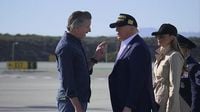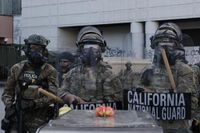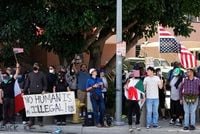On Thursday, June 12, 2025, a legal battle over control of the California National Guard amid immigration protests in Los Angeles took a dramatic turn. The 9th U.S. Circuit Court of Appeals temporarily blocked a federal judge’s order that had directed President Donald Trump to return control of the National Guard troops to California Governor Gavin Newsom. This emergency stay came just hours before the original order was set to take effect at noon on Friday, June 13.
The dispute centers on President Trump’s federalization of the California National Guard under Title 10 authority, which permits the president to call the Guard into federal service under limited circumstances such as invasion, rebellion, or inability to enforce federal law. Trump deployed the Guard following protests sparked by immigration raids conducted by Immigration and Customs Enforcement (ICE) agents across Los Angeles on June 6. The protests escalated into violence and unrest, prompting Trump to assert federal control over roughly 4,000 California National Guard members to support federal law enforcement efforts.
However, U.S. District Judge Charles Breyer of San Francisco ruled earlier that day that the deployment was illegal, violating the Tenth Amendment and exceeding the president’s statutory authority. Breyer’s 36-page decision stated that Trump’s actions “were illegal—both exceeding the scope of his statutory authority and violating the Tenth Amendment to the United States Constitution.” The judge also emphasized that the protests, while involving some violence, did not amount to a rebellion, a key criterion under Title 10 for federalizing the Guard without state consent.
“The protests in Los Angeles fall far short of ‘rebellion,’” Breyer wrote. He noted that the administration failed to identify “a violent, armed, organized, open and avowed uprising against the government as a whole.” Instead, he observed that “the evidence is overwhelming that protesters gathered to protest a single issue—the immigration raids.”
Breyer’s order required the Trump administration to return control of the National Guard to Governor Newsom “forthwith,” warning that the continued federal control deprived California of thousands of Guardsmen needed for critical state functions such as firefighting and combating the fentanyl trade.
California’s governor had sued the federal government to block the Guard’s deployment against his wishes, arguing not only that the president lacked authority but also that involving the Guard in immigration raids risked escalating tensions and civil unrest. Governor Newsom labeled the federalization a “serious breach of state sovereignty” and warned that the federal overreach threatened democracy itself.
“Today was really about a test of democracy, and today we passed the test,” Newsom said in a news conference following the district court ruling. California Attorney General Rob Bonta praised the decision as “a critical early indication” that the court recognized the merits of the state's case. “We aren’t in the throes of a rebellion,” Bonta stated. “The situation in Los Angeles last weekend didn’t warrant the deployment of military troops, and their arrival only inflamed the situation.”
Despite the ruling, the Trump administration swiftly appealed. White House spokesperson Anna Kelly called Breyer’s order “unprecedented” and accused it of putting federal officials in danger. “The district court has no authority to usurp the President’s authority as Commander in Chief,” Kelly said. “The President exercised his lawful authority to mobilize the National Guard to protect federal buildings and personnel in Gavin Newsom’s lawless Los Angeles.” The administration vowed to seek “ultimate victory on the issue.”
The 9th Circuit Court of Appeals’ emergency stay means the National Guard remains federalized through the weekend, with a hearing scheduled for Tuesday, June 17, 2025. The three-judge panel includes two Trump appointees and one Biden appointee, underscoring the case’s high stakes and complexities.
Adding to the tension, approximately 700 active-duty Marines have been undergoing civil disturbance training at Naval Weapons Station Seal Beach in Orange County. Nicholas Green, an attorney representing California, informed the court that within 24 hours, 140 Marines were expected to relieve National Guard members in Los Angeles. However, none of the Marines have been trained to participate in immigration raids, and it remains unclear if they will be deployed for such operations.
Legal arguments have focused on the procedural requirements of Title 10, which mandates that presidential orders to federalize the National Guard be issued “through the governors of the States.” In this case, Defense Secretary Pete Hegseth sent a memo directly to the head of the California Guard to mobilize troops, bypassing Governor Newsom’s consent. Newsom responded by formally requesting the rescission of the troop deployment, describing it as a move designed to inflame tensions and deprive the state of essential resources.
At the hearing, Judge Breyer expressed skepticism of the Justice Department’s claim that courts lack jurisdiction to review the president’s decisions on such matters. “We’re talking about the president exercising his authority, and the president is of course limited in that authority. That’s the difference between a constitutional government and King George,” Breyer remarked, underscoring the constitutional limits on executive power.
Protests and unrest have not been confined to Los Angeles. Following the federalization and deployment of troops, demonstrations have intensified and spread to cities such as Boston, Chicago, and Seattle. While President Trump has described Los Angeles as being on the brink of disaster, local leaders including Mayor Karen Bass and Governor Newsom have contested these characterizations, insisting the situation does not justify a militarized response.
The case has drawn attention from across the country, with attorneys general from 18 states and Los Angeles City Attorney Hydee Feldstein-Soto backing California’s position. A coalition of retired military officials has also publicly supported the lawsuit, warning against unlawful domestic deployments that threaten national security and disaster relief missions.
As the legal battle unfolds, the outcome will have significant implications for federalism, civil liberties, and the balance of power between state governors and the federal government in managing National Guard forces. With the appeals hearing just days away, all eyes remain on the courts to determine whether President Trump’s federalization of the California National Guard will stand or be overturned.



